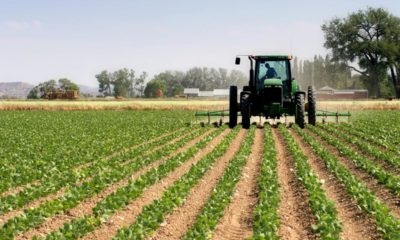- Farmers Want Cocoa Drink included in FG Feeding Programme
The Cocoa Farmers Association of Nigeria (CFAN) has called for the inclusion of cocoa drink in the Federal Government Home Grown School Feeding Programme.
The call was made by the CFAN president, Mr Adeola Adegoke, during his inauguration in Akure, Ondo State, saying the inclusion have both health and economic benefits to the country and the people.
Adegoke, explained that cocoa tea is rich in nutrients that are beneficial to both children and adults.
He said one of the major problems in the cocoa sector was that Nigerians consume less of what we produce and which always have negative impacts on the price of the commodity.
He therefore called on federal and state government to join hands with CFAN to reposition the cocoa sector so that it can take its rightful position among the cocoa producing countries.
He expressed CFAN’s readiness to raise the standard and quality of cocoa beans in the country by engaging in Good Agricultural Practices (GAP) in order to raise the age of cocoa beans locally and globally.
He commended governors of all the cocoa producing states and other stakeholders for various efforts towards promoting cocoa production.
He specifically commended the Ondo State Governor, Mr. Rotimi Akeredolu, for free distribution of 250,000 cocoa seedlings to farmers in thr state.
He said “it is our added conviction that Ondo as a leading state has a pacesetter role to play in the cocoa sustainability programme in Nigeria.”
Speaking at the event, Akeredolu, who was represented by the Commissioner for Agriculture, Mr Adegboyega Adefarati, charged CFAN to put measures in place to ensure that cocoa farming becomes more attractive to the youth.
While stating that the government had been tackling some challenges confronting cocoa production in the state, Akeredolu charged farmers to avoid sharp practices in a order to ensure that production in f quality commodity.
He listed some of the challenges to include, old age of farmers and farms, urbanisation, price fluctuation, old varieties of cocoa and poor roads among others.
He said, ” this administration will continue to work tirelessly to ensure that your request are given priority attention. As i speak, work is in progress in more than 60km feeder roads linking the various farm camps and villages to enable our farmers move their produce without hitch.
“It is equally worthwhile to mention that this administration has embarked on free distribution of cocoa seedlings to farmers for their new planting and rehabilitation programmes in the current year”
Former governor of the state, Olusegun Mimiko, urged the government to embark on action that would ensure that cocoa farmers make more profit on their product after spending so much on the production of cocoa.
He expressed displeasure over the activities of the middlemen who usually determine the price of cocoa for farmers who work all through the year on farm.
Mimiko said, “Our responsibility is to add value to cocoa sector and make it more profitable. The value accrued to farmers is usually less than six percent.
He said farmers were in bondage in terms of gain as they cannot determine the price of their product in the market.

 Forex3 weeks ago
Forex3 weeks ago


 Naira2 weeks ago
Naira2 weeks ago
 Billionaire Watch2 weeks ago
Billionaire Watch2 weeks ago




 Naira2 weeks ago
Naira2 weeks ago




 Naira2 weeks ago
Naira2 weeks ago




 Naira1 week ago
Naira1 week ago




 Naira4 weeks ago
Naira4 weeks ago




 Naira3 weeks ago
Naira3 weeks ago


















